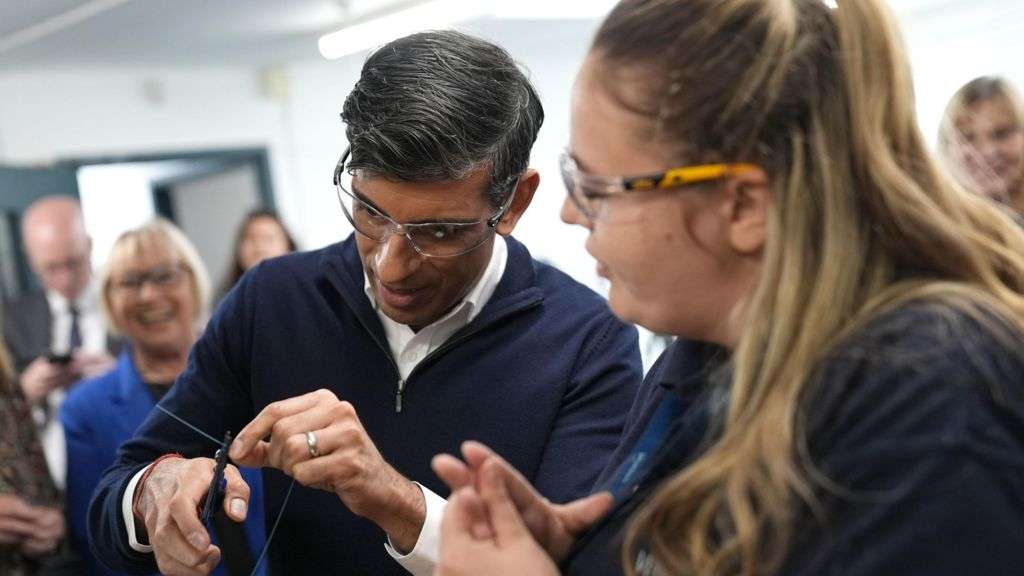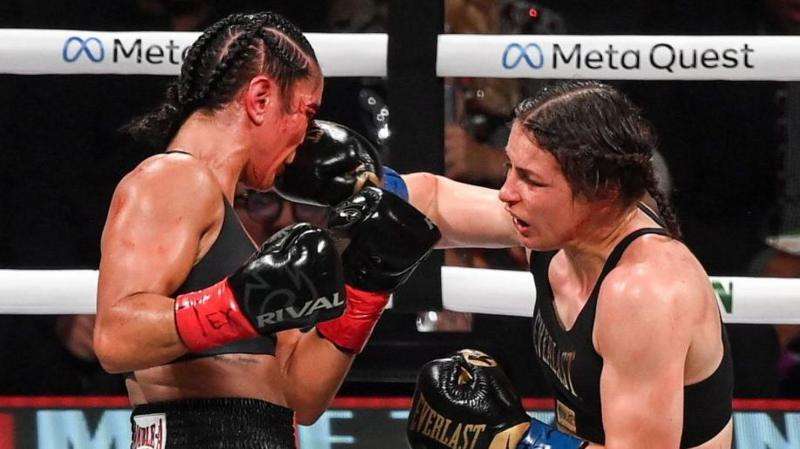The Conservatives have promised to scrap some university courses in England to help fund 100,000 apprenticeships per year if they win the July election.
The party says it would replace the "worst-performing" degrees that it considers a "rip-off" because of high drop-out rates and "poor" job prospects.
Labour criticised the government over a decline in the number of new apprentices.
It said it would prioritise "gearing" apprenticeships towards young people.
The Liberal Democrats said the government had treated apprentices like "second-class workers".
The Conservatives said former Labour Prime Minister Tony Blair's ambition to get half of young people going to university had "led to low-value degrees ballooning".
In England, the Office for Students (OfS) can already investigate and sanction a university - for example with fines - if it falls below certain standards.
The Conservatives say they would introduce a new law allowing the independent regulator to go further and completely close the poorest-performing university courses.
They would be determined by dropout rates, job progression and future earnings potential, the party said in a press release.
Speaking at a railway depot in Cornwall on Wednesday, Prime Minister Rishi Sunak added: "University is great and it makes a fantastic option for young people, but it's not the only option... And what we do know is that there are university degrees that are letting young people down."
Speaking to OceanNewsUK, Schools Minister Damian Hinds said there had been a "huge increase in quality" in apprenticeships under Conservative governments. Now was the time to "make sure we're maximising the available opportunities for young people" and supporting businesses with the new scheme, he added.
Asked about the high number of people dropping out of an apprenticeship before finishing it, he said: "It is true that some young people start an apprenticeship and then they don't [finish it], and then they take a different turn in their career. When they do that, they've accumulated of course skills and experience in that job, and they've been earning.
"That has long been true in apprenticeships."
He said it would not be "right or fair" on current students to say which courses his party considered to be "rip-off" degrees, and said it varied by individual courses rather than by subject.
"Take computer science - you get earnings outcomes from young people studying computer science degrees which will range from £18,000 to £80,000."
Last July, the government announced plans to ask the OfS to cap student numbers on courses that were "failing to deliver good outcomes for students".
The Conservative Party estimated that the government would save £910m by 2030 if it scrapped courses that taught 13% of students.
It said this was because the taxpayer “offsets” student loans when graduates do not earn enough money to pay them back. The logic here is that removing courses that lead to lower earnings would result in less unpaid debt.
Chloe Field, from the National Union of Students, said using earnings to measure the value of degrees was "a poor metric, because things like race, class, gender, and disability have a much more significant impact on people’s wages".
The Conservatives' calculations are based on the assumption that 75% of the students who would have enrolled on those courses would go into employment or apprenticeships instead.
However, there is no limit on the overall number of students that universities in England can admit - so universities could recruit students on to other degree courses if some were closed.
The Institute for Fiscal Studies said this meant it was "unclear" whether savings from scrapping "low-value" courses would be large enough to fund the Tories' expansion plan.
The Conservatives said its savings would allow the government to spend £885m on creating 100,000 more apprentices per year by the end of the next Parliament.
The Association of Employment and Learning Providers welcomed the announcement, and it said it hoped other political parties would "match this additional funding".
Chief executive Ben Rowland said: "Whichever party finds itself in government, there will need to be a commitment to encouraging more employers [to] offer apprenticeship opportunities."
Neil Carberry, chief executive of the Recruitment and Employment Confederation trade body, said the announcement was "using apprenticeships to denigrate university courses, when we need both to flourish if we're going to grow".
Apprenticeships are funded partly by the taxpayer as well as by the apprenticeship levy, which is essentially a tax paid by bigger businesses. Those firms, as well as smaller ones, can access the cash to spend exclusively on training apprentices.
Mr Carberry said the levy made apprenticeships more expensive to deliver - particularly lower-level apprenticeships aimed at younger people - so firms were better off if they did fewer of them.
He said while higher-level apprenticeships were replacing degrees for some people, they did not help people who would not have gone to university and needed a different route to skilled work.
Labour's shadow education secretary, Bridget Phillipson, said the announcement was "laughable" because the Conservatives had "presided over a halving of apprenticeships for young people".
She reiterated her party's promises to introduce technical excellence colleges aimed at training workers for local industries, and to reform the apprenticeship levy into a "growth and skills levy", which the party says would allow businesses to spend up to half of their levy payments on "more flexible training courses".
Munira Wilson, education spokeswoman for the Liberal Democrats, said the Conservatives had "broken the apprenticeship system" and "urgent reform is needed".
"The shockingly low pay for those on apprenticeships will remain, doing nothing to encourage more people to take apprenticeships up or tackle soaring dropout rates," she said.
How many people do apprenticeships?
There are no UK-wide figures for the number of apprentices, but the number has fallen over time in England.
Total new apprentices fell from 509,400 in 2015-16 to 321,400 in 2020-21. It has risen slightly since the pandemic, reaching 337,100 in 2022-23.
The government has said it wants more young people to start apprenticeships. Last year, 23% of new apprentices were under 19.
Overall, the number of young people starting apprenticeships fell from 131,400 in 2015-16 to 65,200 in 2020-21, rising to 77,700 in 2022-23.
Dropout rates in England are about one in two.
Just over half (54.6%) of apprentices completed and passed a final assessment in 2022-23 - well below the government's 67% target by the end of 2024-25.








